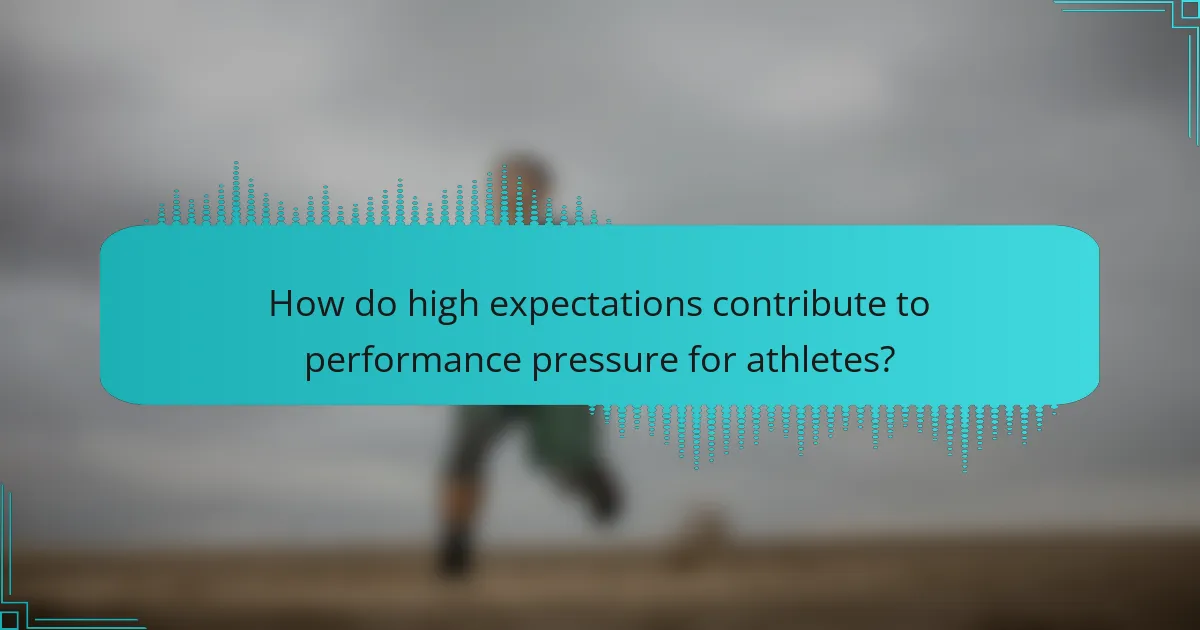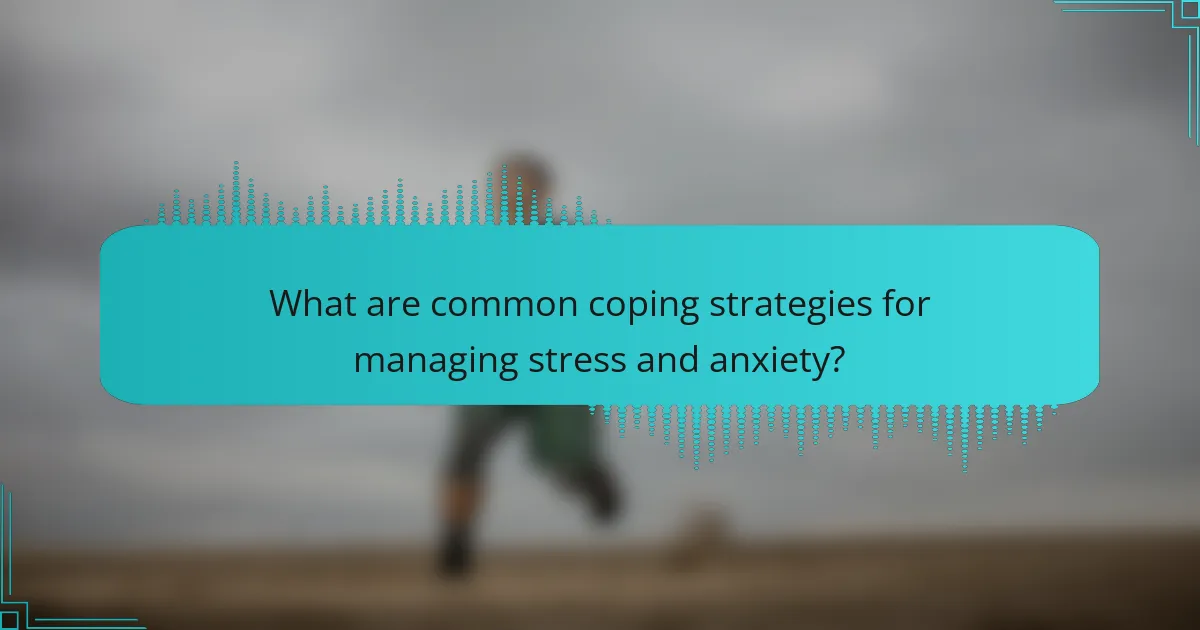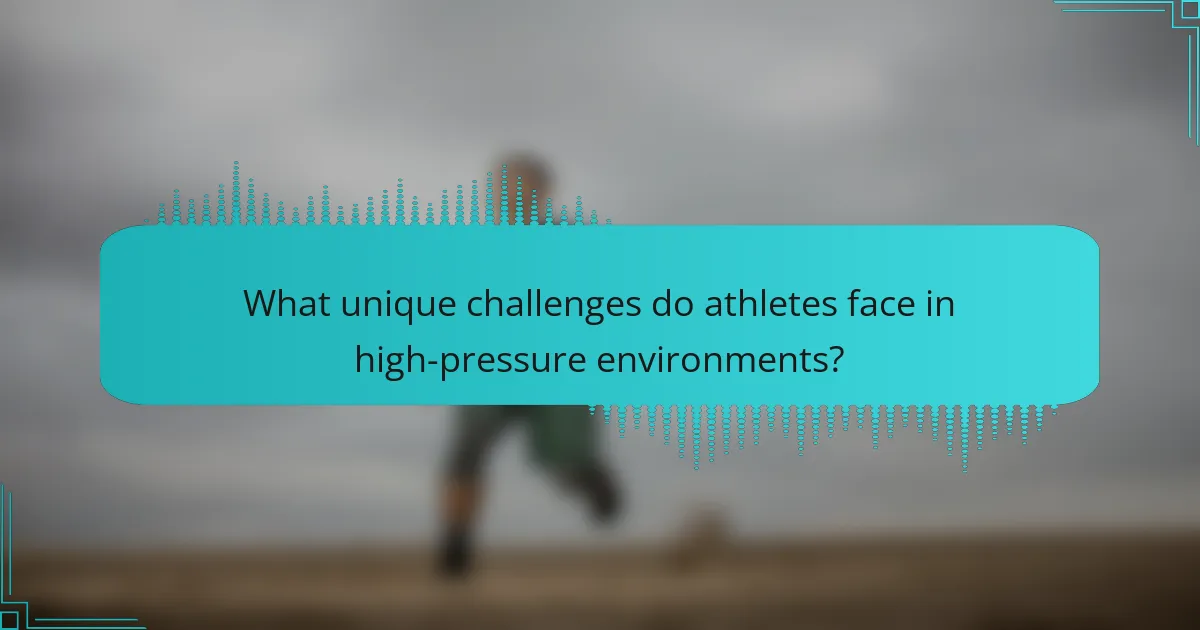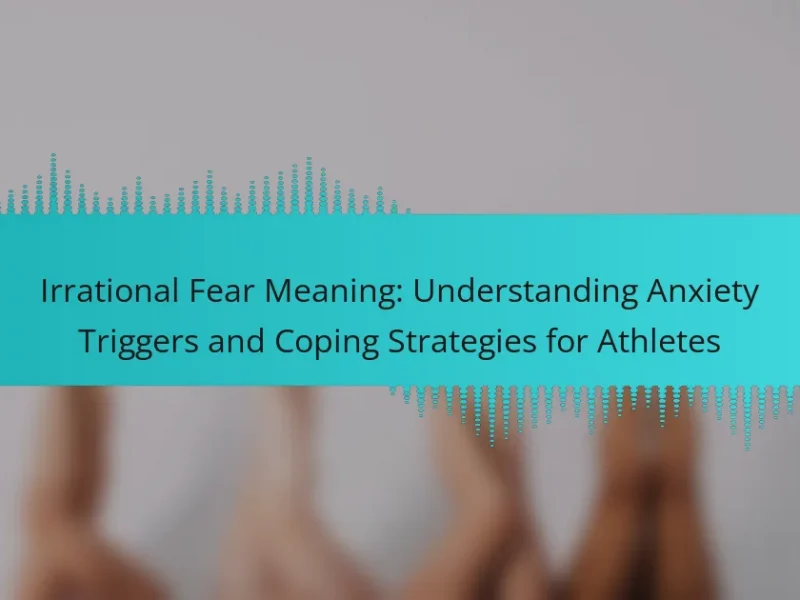High expectations can lead to significant performance pressure, stress, and anxiety for athletes. This article explores the impact of such pressure on mental well-being, discusses effective coping strategies like mindfulness and visualization, and emphasizes the importance of a supportive network. It also highlights the need for balanced lifestyles and realistic goal-setting to manage these challenges effectively.

How do high expectations contribute to performance pressure for athletes?
High expectations can significantly heighten performance pressure for athletes. This pressure often leads to increased stress and anxiety, impacting overall performance.
Athletes may feel compelled to meet or exceed these expectations, resulting in mental strain. The fear of failure can create a detrimental cycle, where anxiety hampers focus and performance. Research indicates that athletes with higher expectations often report elevated levels of stress, which can affect their physical and mental well-being.
Additionally, the societal and media scrutiny surrounding elite athletes can exacerbate this pressure. The constant evaluation can lead to self-doubt and a loss of enjoyment in the sport. As a result, managing these expectations through mental conditioning and support systems becomes crucial for maintaining performance and well-being.
What psychological effects do high expectations have on athletes?
High expectations can lead to increased performance pressure, stress, and anxiety in athletes. These psychological effects may hinder their performance and overall well-being. Athletes often feel compelled to meet or exceed these expectations, which can result in fear of failure and self-doubt. Research indicates that athletes with high expectations may experience heightened anxiety levels, impacting their focus and decision-making during competitions. Additionally, the pressure to perform can lead to burnout, affecting long-term athletic careers. Managing these expectations through mental training and support systems is crucial for maintaining optimal performance and mental health.
How can performance pressure lead to stress and anxiety?
High performance pressure can significantly lead to stress and anxiety in athletes. The relentless pursuit of high expectations often creates an overwhelming environment where fear of failure becomes prevalent. As a result, athletes may experience physiological symptoms such as increased heart rate and tension, alongside psychological effects like self-doubt and worry. Research indicates that managing performance pressure through effective coping strategies can mitigate these stress responses, enabling athletes to perform at their best while maintaining mental well-being.
What are the signs of stress and anxiety in athletes?
Athletes may exhibit signs of stress and anxiety through physical and psychological symptoms. Common indicators include increased heart rate, muscle tension, fatigue, irritability, and difficulty concentrating. Unique attributes such as changes in sleep patterns and appetite can also signal underlying stress. Identifying these signs early is crucial for effective management.

What are common coping strategies for managing stress and anxiety?
To manage performance pressure, stress, and anxiety, athletes can use several effective coping strategies. Techniques such as mindfulness meditation, deep breathing exercises, and visualization are commonly adopted. These methods help athletes focus on the present, reduce tension, and enhance mental clarity.
Regular physical activity plays a crucial role in stress management. Engaging in workouts releases endorphins, which improve mood and promote relaxation. Establishing a support network of coaches, teammates, and mental health professionals can also provide emotional assistance and guidance.
Maintaining a balanced lifestyle is vital. Athletes should prioritize sleep, nutrition, and hydration to support overall well-being. Setting realistic goals and breaking tasks into manageable steps can alleviate feelings of overwhelm.
Finally, practicing positive self-talk and affirmations can boost confidence and resilience, helping athletes navigate challenges more effectively.
How can athletes develop mental resilience?
Athletes can develop mental resilience by implementing effective coping strategies and maintaining a positive mindset. Techniques such as visualization, mindfulness, and goal setting help manage performance pressure. Research indicates that athletes who practice these methods experience reduced stress and anxiety levels, enhancing their overall performance. Additionally, seeking support from coaches and peers fosters a strong mental framework, allowing athletes to navigate challenges more effectively. Regularly reflecting on experiences also builds resilience, as it encourages learning from setbacks and adapting to future pressures.
What role does physical training play in coping with performance pressure?
Physical training significantly enhances an athlete’s ability to cope with performance pressure by building physical resilience and mental toughness. Consistent training develops muscle memory, allowing athletes to execute skills under stress. This preparation reduces anxiety and boosts confidence during competitions. Research shows that structured training programs improve focus and emotional regulation, crucial for managing high expectations. Furthermore, physical training fosters a routine that instills discipline, helping athletes handle pressure more effectively.
What techniques can athletes use for relaxation and focus?
Athletes can use techniques such as deep breathing, visualization, mindfulness, progressive muscle relaxation, and routine establishment to enhance relaxation and focus. These methods help manage performance pressure, reduce stress, and alleviate anxiety.
Deep breathing involves slow, controlled breaths to calm the nervous system. Visualization allows athletes to mentally rehearse successful performances, enhancing confidence. Mindfulness practices promote present-moment awareness, reducing distractions. Progressive muscle relaxation helps release physical tension, while establishing a routine creates consistency and predictability, which can lower anxiety levels.
How does nutrition impact an athlete’s mental health?
Nutrition significantly influences an athlete’s mental health by affecting mood, energy levels, and cognitive function. A balanced diet rich in nutrients can reduce stress and anxiety, promoting better performance under pressure. For example, omega-3 fatty acids found in fish improve brain health, enhancing focus and reducing depressive symptoms. Additionally, carbohydrates are crucial for energy, while hydration impacts concentration and mood stability. Athletes who prioritize nutrition often experience lower levels of performance anxiety and improved resilience. Thus, a well-planned diet serves as a vital tool for managing the mental challenges of competitive sports.

What unique challenges do athletes face in high-pressure environments?
Athletes in high-pressure environments face unique challenges that impact their performance. These include intense expectations, heightened stress levels, and anxiety that can hinder focus.
High expectations often stem from coaches, fans, and personal goals, leading to performance anxiety. Athletes may struggle to meet these demands, resulting in mental fatigue. Stress management techniques, such as mindfulness and visualization, can mitigate these effects.
Moreover, the pressure to perform can lead to physical symptoms, including increased heart rate and muscle tension. These reactions can detract from an athlete’s ability to execute skills effectively.
Finally, the fear of failure can create a cycle of anxiety, affecting overall well-being. Support systems, including mental health professionals, play a crucial role in helping athletes navigate these challenges.
How do team dynamics influence an athlete’s stress levels?
Team dynamics significantly influence an athlete’s stress levels by shaping their support systems and competition environment. Positive interactions foster confidence, reducing anxiety, while negative dynamics can heighten performance pressure. Research shows that athletes in cohesive teams report lower stress levels, as they feel more supported. Conversely, teams with high conflict often see increased stress and anxiety, impacting overall performance.
What are the implications of public scrutiny on athlete performance?
Public scrutiny can significantly impact athlete performance by increasing pressure, stress, and anxiety. The constant evaluation by fans and media can lead to heightened expectations, which may hinder focus and concentration. Athletes often feel compelled to meet these expectations, resulting in performance anxiety. As a result, mental health support has become crucial in helping athletes manage these pressures. Studies indicate that athletes with strong psychological resilience perform better under scrutiny.

What rare but effective techniques can help in managing performance anxiety?
Mindfulness techniques can effectively manage performance anxiety in athletes. These methods promote focus and reduce stress by encouraging present-moment awareness. Breathing exercises, visualization, and progressive muscle relaxation are rare but impactful strategies. Athletes can practice deep breathing to calm nerves, visualize successful performance to enhance confidence, and use muscle relaxation to release tension. Regular implementation of these techniques fosters resilience against performance pressure.
How can visualization techniques aid in performance preparation?
Visualization techniques significantly enhance performance preparation by reducing anxiety and improving focus. These techniques allow athletes to mentally rehearse their performance, creating a sense of familiarity with high-pressure situations. As a result, athletes can better manage stress and expectations, leading to improved outcomes during competitions. Research shows that mental imagery can increase confidence and optimize physical execution, making it a vital tool in an athlete’s preparation strategy.
What is the impact of sports psychology on athlete performance?
Sports psychology significantly enhances athlete performance by equipping them to manage pressure, stress, and anxiety. Techniques such as visualization and self-talk improve focus and resilience. Research indicates that athletes who engage in psychological training report lower anxiety levels and higher performance consistency. Effective stress management strategies can lead to improved concentration and decision-making during competitions. The unique attribute of tailored mental skills training allows athletes to address individual challenges, enhancing overall performance outcomes.

What best practices can athletes implement to optimize their mental health?
Athletes can optimize their mental health by implementing practices that reduce performance pressure, stress, and anxiety. Key strategies include establishing realistic goals, practicing mindfulness techniques, and fostering a supportive social network.
Setting achievable goals helps athletes manage expectations and reduces the fear of failure. Mindfulness techniques, such as meditation or breathing exercises, enhance focus and emotional regulation. Building a supportive network of coaches, teammates, and mental health professionals provides emotional resilience and encourages open communication about mental health challenges.
Regular self-reflection on performance and mental state can also identify stressors and coping mechanisms. Engaging in physical activities outside of their sport can provide a healthy distraction and promote overall well-being.
How can athletes identify and avoid common mistakes in stress management?
Athletes can identify and avoid common mistakes in stress management by recognizing their triggers and implementing effective coping strategies. Understanding the impact of high expectations is crucial.
Common mistakes include neglecting self-care, ignoring mental health, and failing to communicate concerns. Athletes should prioritize rest, engage in mindfulness practices, and seek support from coaches or mental health professionals.
Establishing realistic performance goals can help mitigate anxiety. Focusing on incremental improvements rather than perfection reduces pressure. Regular reflection on performance can also aid in recognizing patterns of stress and adjusting strategies accordingly.
By addressing these areas, athletes can enhance their resilience and maintain optimal performance under pressure.
What expert insights can guide athletes in handling performance pressure effectively?
Athletes can effectively manage performance pressure by focusing on mental resilience, preparation techniques, and support systems. Developing mental resilience involves practicing mindfulness and visualization, which can reduce anxiety and enhance focus. Preparation techniques, such as setting realistic goals and maintaining a consistent training routine, help athletes build confidence. Additionally, establishing a strong support system with coaches and peers provides emotional backing during high-pressure situations.


